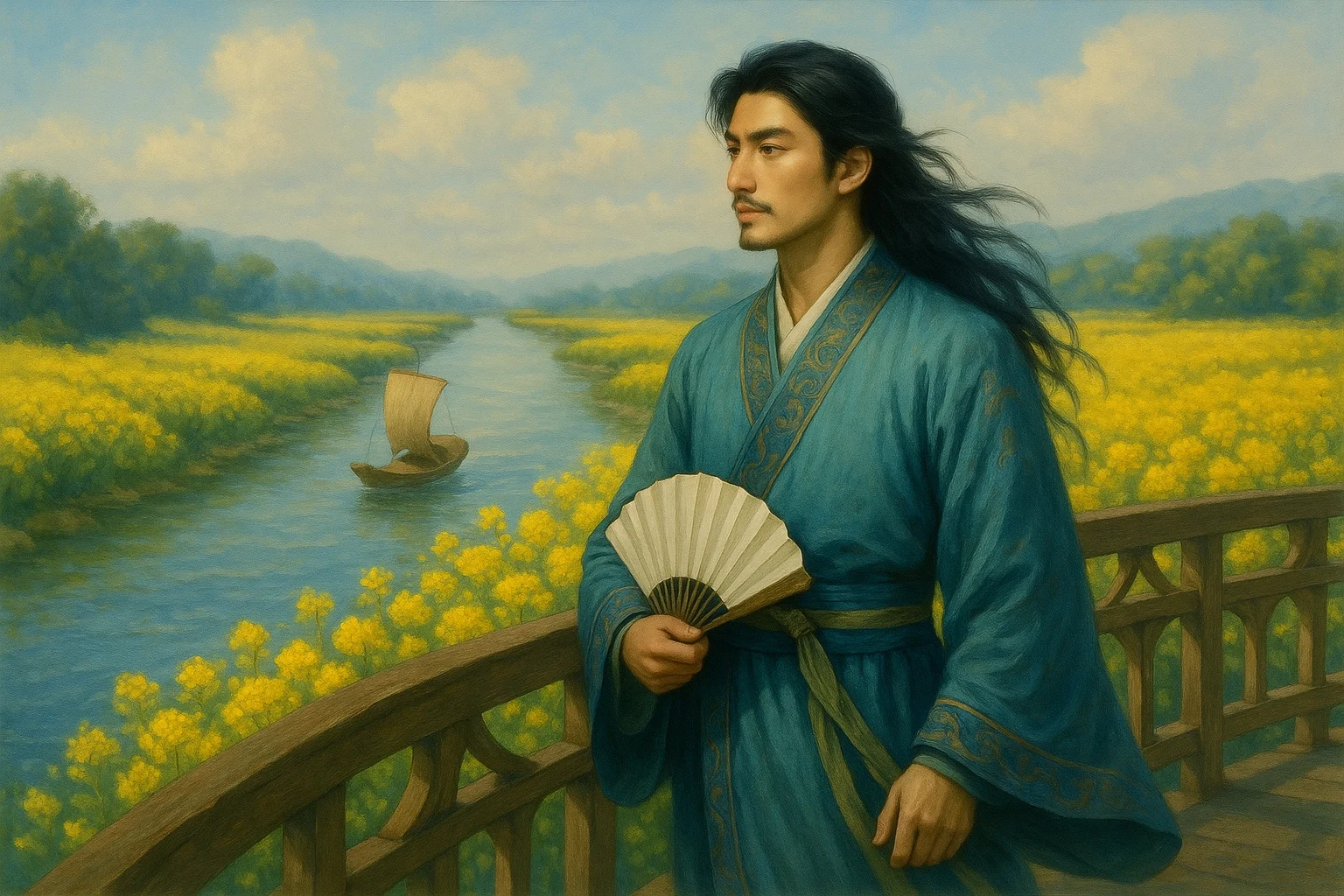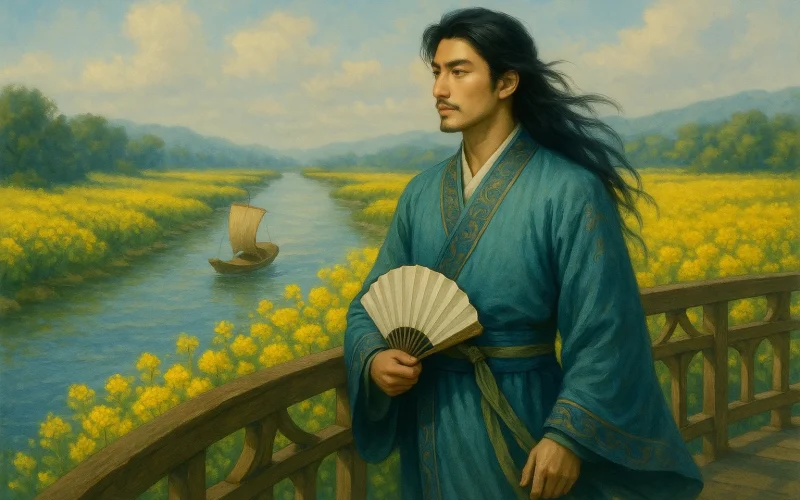Where mist-chilled waters stretch their endless sheen,
Fine crops line roads that wind through leagues unseen.
A lone ape wails from some sea-girt shore,
Wild geese rise loud from lake-fed fields once more.
You’ve strolled through Changzhou’s gardens fair,
Recited odes with courtly flair.
Yet now you bear sealed missives south—
I know you’ll steal naps by the stream’s bright mouth.
Original Poem
「送丘二十二之苏州」
崔峒
积水与寒烟,嘉禾路几千。
孤猿啼海岛,群雁起湖田。
曾见长洲苑,尝闻大雅篇。
却将封事去,知尔爱闲眠。
Interpretation
This poem was composed in the mid-to-late 8th century during the Tang Dynasty, when the Jiangnan water towns enjoyed economic prosperity and cultural vibrancy, with Suzhou being one of its most representative cities. The poet Cui Tong shared a profound friendship with his friend Qiu the Twenty-Second, and upon the latter's departure for Suzhou, Cui composed this farewell poem. It depicts the scenic journey while imbuing the landscape with deep emotion, expressing reluctant parting feelings. The verses reveal the poet's understanding of his friend's official journey, his portrayal of Jiangnan scenery, and his appreciation for the pleasures of reclusive living - seamlessly blending scenery, emotion, and reflection with remarkable lyrical charm.
First Couplet: "积水与寒烟,嘉禾路几千。"
Jī shuǐ yǔ hán yān, jiā hé lù jǐ qiān.
Vast waters merge with chilly mist,
To Jiahe (Suzhou) - the winding way persists.
The opening lines construct a boundless waterscape with "vast waters" and "chilly mist." "Jiahe" (an ancient name for Suzhou) and the exaggerated "winding way" emphasize both the journey's distance and its anticipated challenges, foreshadowing the traveler's long and difficult passage.
Second Couplet: "孤猿啼海岛,群雁起湖田。"
Gū yuán tí hǎi dǎo, qún yàn qǐ hú tián.
A lone ape wails on offshore isles,
Flocks of wild geese rise from lake-field miles.
This couplet employs dynamic imagery to underscore the journey's desolation. The "lone ape" and "flocks of wild geese" - classic symbols of travel and separation - embed emotion within the landscape, conveying both the farewell's melancholy and the traveler's solitude.
Third Couplet: "曾见长洲苑,尝闻大雅篇。"
Céng jiàn cháng zhōu yuàn, cháng wén dà yǎ piān.
I've seen Changzhou's pleasure grounds,
Heard elegant verses' cultured sounds.
The poet recalls his own travels to Suzhou, praising its cultural landmarks. "Changzhou's pleasure grounds" refer to Wu region's famous scenic spot, while "elegant verses" represent refined literary works - celebrating Suzhou's cultural heritage while expressing auspicious hopes for his friend's journey.
Fourth Couplet: "却将封事去,知尔爱闲眠。"
Què jiāng fēng shì qù, zhī ěr ài xián mián.
Yet bearing documents you'll go,
Though I know you love leisure's flow.
The conclusion reveals intimate understanding of the friend's character. "Bearing documents" hints at official duties, while "love leisure's flow" discloses his friend's true preference for reclusive tranquility. The poet adopts a tone of affectionate teasing that conveys both appreciation for his friend's nature and subtle weariness with bureaucratic life.
Holistic Appreciation
Though framed as a farewell poem, this work transcends mere parting to express profound friendship and shared ideals between the poet and his companion. Beginning with scenic description before transitioning to emotional expression and character portrayal, the poem progresses with meticulous structure. Images like "accumulated waters," "chilly mist," "solitary gibbon," and "flocks of wild geese"—all distinctive to Jiangnan's waterside landscapes—are rendered through a blend of realism and imagination, evoking the journey's vast solitude. The introduction of "Changzhou Garden" and "Ode to Noble Virtue" casts cultural and humanistic radiance upon Suzhou, elevating the poem beyond mere landscape depiction to embody literati sentiment. The final couplet pivots sharply, revealing that despite holding office, the friend retains a recluse's leisurely disposition—a nuanced meditation on the tension between public service and reclusion.
Artistic Merits
This poem masterfully interweaves scenery and emotion, using farewell as a thread to unfurl both the journey's distant vistas and Jiangnan's distinctive charm. The language is concise yet vivid, with fresh, lively imagery. Contrasting techniques—such as the stark dichotomy between "official dispatches" and "leisurely naps"—highlight shifting moods and temperaments, reflecting indifference toward worldly career pursuits. The rhythm flows gently, the melody lingers, and deep affection resonates through restraint, embodying the unique aesthetic tastes and spiritual solace of late High Tang literati.
Insights
Beyond its surface farewell theme, the poem conveys a philosophy of companionship: true friendship lies not in constant proximity but in mutual understanding. Even amid officialdom, preserving an inner space for refined leisure becomes a quiet resistance against worldly clamor and vulgarity. In our complex world, maintaining authenticity and cherishing serenity remains life's most precious attitude.
About the Poet

Cui Dong (崔峒, dates of birth and death unknown), a Tang Dynasty poet from Anping, Hebei, was active during the Dali era (766 - 779). Along with Sikong Shu, Lu Lun and others, he was known as one of the "Ten Talents of Dali." His poetry primarily consists of five-character regulated verse (wulü), characterized by an elegant and subtle style. The Complete Tang Poems preserves 48 of his works. His poetic style resembles Liu Changqing's but appears more solitary and austere, reflecting the transition from the vigorous grandeur of High Tang poetry to the introspective quality of Dali-era verse.












